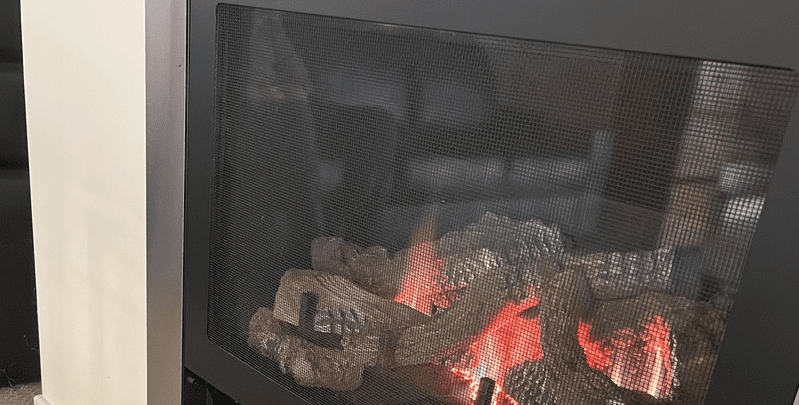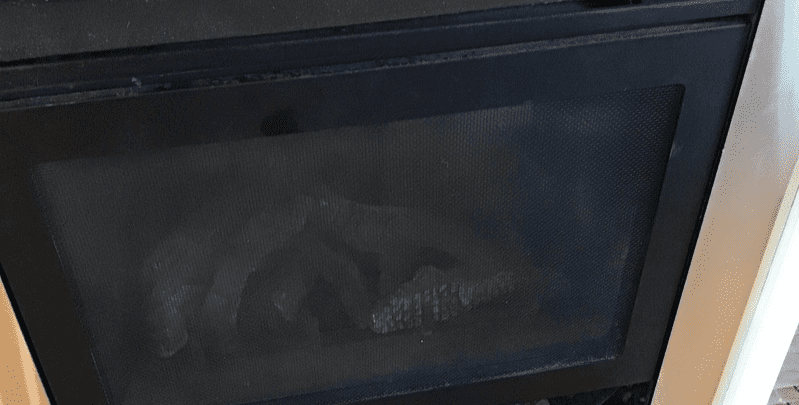Welcome to our comprehensive guide on the safety of leaving a gas log fire on all night. Gas log fires and fireplaces are a popular heating option for many homeowners, known for their convenience and cosiness.
However, whether it is safe to have a gas log fireplace or gas log fireplaces leave them unattended overnight is a concern for many. In this blog, we’ll explore the workings of gas log fires existing fireplaces, their built-in safety features, and the essential factors to consider to ensure a safe and comfortable experience.
Understanding Gas Log Fire Safety
Before we delve into all the hassle and safety considerations of gas log fireplace fires, let’s understand how gas log fires work. These heating appliances use natural gas or propane to produce flames that simulate the appearance of a wood-burning fireplace.
Pilot light or electronic ignition ignites the gas, and the flames dance over ceramic fireplace logs, providing warmth and ambience.
Modern gas log fires come equipped with various safety features to prevent accidents. These may include oxygen depletion sensors (ODS) that shut off the gas supply if the oxygen levels in the room drop to unsafe levels. Additionally, some models have a flame failure device (FFD) that automatically turns off the gas if the flames go out. When using gas log fires, these safety mechanisms are essential for peace of mind.
However, despite the full range and convenience of built-in fireplace safety features, reading and following the manufacturer’s instructions is crucial. Each gas fire or log fire may have specific usage guidelines and precautions that users must adhere to for safe and efficient operation.

Risks of Leaving a Gas Log Fire On All Night
While gas log fires are generally safe when used correctly, leaving them on all night can pose certain risks. One primary concern is the potential for fire hazards. As with any open flame, there is a risk of embers or sparks escaping and igniting nearby flammable materials.
To minimise this risk, ensure that the area around the gas log fire is free from combustible materials and that a suitable safety barrier is in place.
Another critical risk is carbon monoxide (CO) poisoning. The incomplete combustion of natural gas can produce this odourless and colourless gas, which can be deadly in high concentrations. Proper ventilation is vital to prevent CO build up. Always ensure that the room housing the gas log fire has adequate ventilation and that the flues and chimneys are in good working condition.
Leaving a gas log fire on all night can pose several risks to your safety and home. Here are some of the potential dangers:
- Fire hazard: Gas log fires produce real flames, and if left unattended for a prolonged period, there’s an increased risk of a fire breaking out. It could lead to property damage, injuries, or even loss of life.
- Carbon monoxide poisoning: Gas log fires produce carbon monoxide (CO), a toxic gas that can be lethal in high concentrations. Inadequate ventilation or issues with the gas log can lead to the build up of different carbon monoxide in your home, causing carbon monoxide poisoning.
- Oxygen depletion: Burning gas consumes oxygen. Keeping the fire on all night in a closed or poorly ventilated space can lead to oxygen depletion, causing dizziness, headaches, and other health issues.
- Gas leaks: A faulty gas log fire can develop leaks, releasing natural gas into your home. Natural gas is highly flammable; even a tiny spark can ignite it, causing an explosion or fire.
- Increased utility bills: Running a gas log fire continuously all night will consume significant natural gas, leading to higher utility bills.
- Overheating: Leaving the fire on for an extended period can cause the surrounding area to overheat, potentially damaging walls, furniture, or other items near the fire.
Following safety guidelines for operating gas log fires is essential to minimise these risks. Never leave the fire unattended, ensure proper ventilation, have carbon monoxide detectors installed in your home, and have your gas log fire regularly inspected and maintained by a qualified technician. It’s generally best to turn off the gas log fire before bed and use alternative heating methods at night if needed.
Factors That Influence Safety
Several factors can influence the safety of leaving a gas fireplace or log fire all night. The age and condition of your gas fireplace, chimney, or log fire are crucial considerations.
Older gas log fireplaces and fireplace units may have a different level of extensive safety features than newer models, making them riskier for prolonged usage. If you have an older gas log fire, consider having it inspected by a professional to ensure it is safe.
The size of any existing fireplaces or gas fireplaces already in the room and the availability of proper ventilation also play a significant role in storing this. A well-ventilated room with an ideal gas fireplace will help dissipate any potential build up of CO and ensure a steady supply of oxygen for the gas log fire. It’s essential to keep the ideal gas fireplace or log fire in a well-ventilated area, preferably with a window cracked open to allow fresh air to enter.
Installing smoke and carbon monoxide detectors in your home is another essential safety measure. These detectors can provide early warnings in case of any potential hazards, allowing you to take immediate action and prevent accidents.

Best Practices for Leaving a Gas Log Fire On All Night
If you decide to leave your gas log fire on all night, it is crucial to follow some best practices to ensure safety. First, choose a gas log fire model for continuous operation and nighttime use. Research reputable brands and read reviews to find a reliable and safe model.
Before using gas fireplaces, open-top gas fireplaces or leaving the gas fireplaces or log fire unattended, perform a visual inspection to ensure no loose connections, damaged components, or signs of wear. If you notice anything unusual, refrain from using the gas fireplaces or log fire until it has been inspected and repaired by a qualified professional.
When leaving it on overnight, always set the temperature drops of the gas log fire to a lower temperature and flame level. It will help prevent excessive heat buildup from open gas fires and reduce the risk of accidents. Never leave the heat of an open fire or the gas log fire unattended on high or maximum heat output.
Remember to keep the area around the gas log fire clear of flammable materials, such as paper, fabric, or wood. Create a safe zone to prevent accidental ignition of nearby objects.
Alternatives to Leaving the Gas Log Fire On All Night
If you have concerns about leaving the gas log fire on all night, consider using a timer or thermostat. Many modern gas log fires come with these features, allowing you to set specific times for the appliance to turn on and off automatically.
Alternatively, you can use other heaters or supplementary space heating methods to maintain a comfortable temperature in your home. Electric heaters, blankets, or hot water bottles can provide warmth without an open flame.
Creating a cosy sleeping environment without constant gas heating is an easy installation also an option. Use warm blankets and dress warmly to maintain a comfortable sleep temperature without relying solely on the heat from the gas heater or log fire.
Always Be Safe with Your Gas Log Fire
In conclusion, the safety of leaving a gas log fire on all night depends on various factors and responsible usage. Gas fires can be a delightful and efficient heating option when used correctly and with proper precautions. Always prioritise safety and high efficiency by choosing a reliable model, maintaining the appliance, ensuring ventilation, and installing smoke and carbon monoxide detectors.
If you have any doubts or concerns about the modern gas log or gas fireplaces used, consult a professional for expert advice. Remember, with the right approach. You can enjoy the cosy warmth of a gas-log fire without compromising safety and high efficiency.
Please note: This information is provided for advice purposes only. Regulations differ from state to state, so please consult your local authorities or an industry professional before proceeding with any work. See our Terms & Conditions here.

